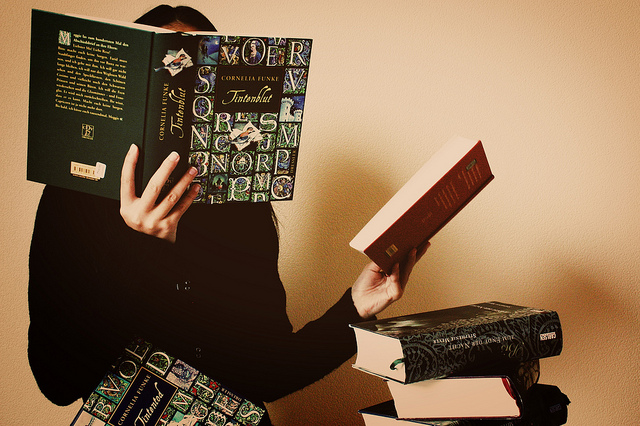Find your library search personality type and get our tips for how to make the most of the information that is out there, just waiting for you… By Kate Courage
When your tutor says to you, “You really need to work on your bibliography. Try some of the Library’s databases…”, rather than sticking your head back in the sand and heading straight for the Dirty Duck, take our tailored advice to suit your own unique approach to finding Library resources.
The bookworm:

You are nothing if not traditional in your approach to finding literature for your work. You will perhaps go as far as Library Search (but you probably prefer the more established Classic Catalogue), to search for books recommended by tutors and on reading lists. You also enjoy wandering the aisles in the Library, browsing the shelves and savouring the beauty (and yes, probably the smell) of rows and rows of lovely printed books. The idea of branching out and doing an online search for material makes you feel mildly panicked.
Our advice:
You are missing out on the huge amounts of information out there, beyond the physical collection in the Library. Introduce yourself to Library databases and have a look to see what databases are recommended for your subject on the library website. Some of these will be collections of entire full-text e-books, other are vast journal archives, with full articles available to read. We’ve got everything from huge interdisciplinary databases to niche special collections in a particular subject area. You need to try these things. You don’t know what you are missing!
The butterfly:

You are keen on the idea of branching out beyond your reading list, but generally lack the dedication to do a thorough and well-planned search. You love it when you come across an e-book on Library Search, because you can open it up, flutter through a few pages and then go and make a cup of tea, feeling pleased at having added a resource to your reference list in no time. You also love broad search engines, like Google Scholar and the Library Search article search, which allow you to quickly search for a couple of keywords and give you loads (usually many thousands) of results really fast.
Our advice:
It is great to use e-books and sometimes good to do quick, broad searches using search engines, but this will only allow you to skim the surface of the available literature, and not provide a reliable route to the most relevant academic material in your area. You will do a much better search if you take the time to choose your search terms carefully, think about alternative terms and consider how they should be combined to do an effective search (OR to combine synonyms/related terms where you want ANY of them; AND to combine concepts, where you want ALL of them). You will also do a more systematic and effective search, if you use an academic database.
The sloth:

Let’s face it; the idea of trawling through either the physical or electronic collections in the Library doesn’t fill you with inspiration. You are much more likely to leave it to the last minute and then do a quick Google search and pray that somewhere on the first couple of pages you will find something useful. Someone on your course also suggested limiting your Google search to PDF documents, so you will be more likely to pull up usable full-text resources. Great idea, right…? Wrong!
Our advice:
You really need to learn some quick tips for effective Library searching. The tip for limiting Google results to PDFs sounds great, but Google doesn’t contain even a fraction of the full-text resources that Warwick has, so you are missing out on vast amounts of relevant scholarly literature. You would be better to try Google Scholar, which allows you to quickly set up Library Links, to show you where Warwick may have access.
Try easing yourself into the world of Library resources gently with some easy-to-use, full-text databases of journal articles (such as JStor, Project Muse, or ScienceDirect) or e-book content (such as Oxford Scholarship, Cambridge Books or Palgrave Connect). These give instant gratification, and before you know it you will have caught the detective bug, and be ready to trawl the delights of the full range of databases for your subject.
The detective:
 You can rightly feel a bit smug at this point. You have already discovered the delights of Library research: the satisfaction of finding that perfect journal article, and the joy of discovering a database dedicated to your topic, which contains swathes of digitised primary documents to make your research genuinely original!
You can rightly feel a bit smug at this point. You have already discovered the delights of Library research: the satisfaction of finding that perfect journal article, and the joy of discovering a database dedicated to your topic, which contains swathes of digitised primary documents to make your research genuinely original!
Our advice:
You just need to make sure that you are aware of the many ways of getting hold of the full-text of useful content. If the database doesn’t contain it, and WebBridge doesn’t find it, make sure you try Article Reach to track down useful journal articles. This service approaches other Libraries worldwide, who will email the article to you, if they have it. Failing this, you can also ask your tutor to authorise a document supply form, and borrow the item from another Library. You are also, most likely, a perfectionist! So, if you would like reassurance that you are searching in all the most sensible places, contact your Academic Support Librarian, to make an appointment to discuss your research.
Find out what kind of animal you are next!

Images:
Bookworm/Pimthida/CC BY-NC-ND 2.0
Butterfly/Whologwhy/CC BY 2.0
Three Toed Sloth/Pierre Pouliquin/CC BY-NC 2.0
Sherlock Holmes at Baker Street. (86/365)/Alba Estévez G./ CC BY 2.0
Reading/Bunches and Bits {Karina}/CC BY-NC-ND 2.0
Like this? Tweet this!
#studyblog
